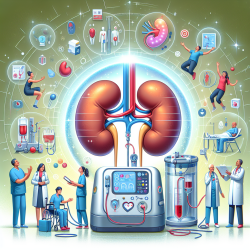Introduction
In the realm of prenatal care, addressing the multifaceted challenges faced by pregnant African American women is crucial. The study titled "The design, implementation and acceptability of an integrated intervention to address multiple behavioral and psychosocial risk factors among pregnant African American women" sheds light on an innovative approach to tackle these challenges. This blog explores the study's findings and their implications for practitioners seeking to enhance their skills and improve outcomes for this vulnerable population.
The Power of Integrated Interventions
The DC-HOPE study underscores the importance of addressing multiple risk factors simultaneously rather than in isolation. By integrating interventions for cigarette smoking, environmental tobacco smoke exposure, depression, and intimate partner violence, the study aimed to improve pregnancy outcomes for African American women in Washington, DC. This approach recognizes the complex interplay between these factors and their cumulative impact on maternal and infant health.
Key Findings
- 48% of women screened were eligible based on the presence of targeted risks, with 76% of those eligible enrolling in the study.
- The intervention was delivered in 10 sessions, aligning with prenatal and postpartum care visits.
- 84% of intervention participants attended at least one session, with 60% attending four or more sessions.
- 93% of the subsample of intervention women reported a positive relationship with their counselor, highlighting the importance of supportive therapeutic relationships.
Implications for Practitioners
For practitioners, the DC-HOPE study offers valuable insights into the design and implementation of integrated interventions in prenatal care settings. Here are some key takeaways:
- Holistic Approach: Addressing multiple risk factors simultaneously can lead to better outcomes by acknowledging the interconnected nature of these challenges.
- Flexibility and Adaptation: Practitioners should be prepared to adapt interventions based on individual needs and circumstances, ensuring that the content remains relevant and engaging.
- Building Therapeutic Relationships: Establishing trust and rapport with clients is essential for successful intervention delivery and client satisfaction.
- Data-Driven Decisions: Utilizing data to inform intervention design and implementation can enhance the effectiveness and acceptability of the approach.
Encouraging Further Research
While the DC-HOPE study provides a robust framework for integrated interventions, there is a need for further research to explore its long-term impact and potential applications in diverse settings. Practitioners are encouraged to engage in ongoing research and collaboration to refine and expand these interventions, ultimately improving outcomes for pregnant African American women and their infants.
Conclusion
The DC-HOPE study exemplifies the potential of integrated interventions in transforming prenatal care for African American women. By addressing multiple behavioral and psychosocial risk factors, practitioners can create more comprehensive and effective care models. As we continue to learn from and build upon this research, we move closer to achieving equitable health outcomes for all.
To read the original research paper, please follow this link: The design, implementation and acceptability of an integrated intervention to address multiple behavioral and psychosocial risk factors among pregnant African American women.










